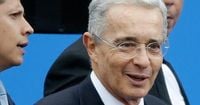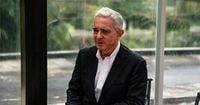In a landmark decision that has shaken Colombia's political landscape, former President Álvaro Uribe was found guilty on Monday, July 28, 2025, of witness tampering and bribery. This verdict marks the first time in Colombia's history that a former head of state has been convicted in a criminal trial, underscoring the gravity and historic significance of the case.
The ruling, delivered by Judge Sandra Liliana Heredia after a marathon hearing lasting over ten hours, concluded that Uribe, 73, conspired with a lawyer to pressure three former paramilitary members in prison to change their testimony. These witnesses had initially provided statements to Iván Cepeda, a left-wing senator who had launched an investigation into Uribe’s alleged ties to paramilitary groups active in the 1990s.
The origins of the case trace back to 2012 when Uribe filed a libel suit against Cepeda, accusing him of orchestrating a conspiracy involving witness bribery to link Uribe to paramilitary groups. However, in a surprising turn, the Supreme Court dismissed the charges against Cepeda in 2018 and instead launched an investigation into Uribe's conduct, eventually charging him with witness bribery and procedural fraud.
Judge Heredia emphasized the impartiality of her ruling, stating, "Justice does not kneel before power," and urged Colombians to respect the decision as an act of justice rather than a victory for any political faction. She also highlighted the crucial role women played in investigating and adjudicating the case, despite facing misogynistic attacks throughout the process.
While Uribe was found guilty of two crimes, he was acquitted of a separate bribery charge. The judge noted that Uribe was aware his actions were illegal, yet the trial did not reach conclusions about his alleged connections to paramilitary groups; it focused exclusively on his attempts to manipulate witness testimony.
Uribe followed the verdict from his home near Medellín, not appearing in court for the decision. His legal team announced plans to appeal the conviction, with sentencing scheduled for a separate hearing on Friday, August 1, 2025. Due to his age, Uribe may serve any prison sentence under house arrest if the conviction is upheld.
Throughout his presidency from 2002 to 2010, Uribe was a polarizing figure. He led an aggressive military campaign against Colombia's largest leftist rebel group, the Revolutionary Armed Forces of Colombia (FARC), significantly weakening the insurgency and bringing a degree of security previously unseen in the country. His administration received substantial support from the United States, which provided millions of dollars in aid, training, and equipment to bolster Colombia's fight against drug trafficking and armed guerrillas.
In recognition of his efforts, President George W. Bush awarded Uribe the Presidential Medal of Freedom in 2009, the highest civilian honor in the U.S. Yet, critics accuse Uribe of fostering relationships with violent right-wing paramilitary groups and of overseeing a military implicated in thousands of extrajudicial killings, known as the “false positives” scandal, where civilians were falsely labeled as combatants to inflate body counts.
Uribe has consistently denied any involvement in these abuses and maintains his innocence regarding the charges in this trial. He also emphasized that he extradited paramilitary leaders to the United States during his tenure.
The trial and conviction have sparked intense political debate both within Colombia and internationally. Colombian President Gustavo Petro, a former leftist guerrilla and Uribe’s political rival, defended the ruling on social media, asserting that "a strong justice system will enable Colombia to emerge from violence" and criticized external interference, specifically pointing to U.S. Secretary of State Marco Rubio.
Rubio, a staunch supporter of Uribe, condemned the trial on X (formerly Twitter), stating, "Uribe's only crime has been to tirelessly fight and defend his homeland. The weaponization of Colombia's judicial branch by radical judges has now set a worrisome precedent." Rubio's comments reflect concerns among some U.S. conservatives who view the case as politically motivated.
These tensions extend to U.S.-Colombian relations, with Banco de Bogotá warning that a decision against Uribe could provoke reprisals from the U.S. government. This statement references a proposal by Republican Congressman Mario Diaz-Balart to cut non-military aid to Colombia in 2026, partly due to concerns over due process violations in Uribe's case.
Uribe’s trial also resonates beyond Colombia, joining a list of Latin American leaders—such as Peru's Alberto Fujimori and Brazil's Luiz Inácio Lula da Silva—who have faced criminal convictions, highlighting a regional trend of holding powerful figures accountable for alleged abuses.
The verdict has divided Colombian society. Supporters of Uribe, including members of his Democratic Center party, view the case as a political persecution and rally behind their leader, some even donning masks bearing his likeness during demonstrations outside the court. Conversely, his detractors hail the decision as a long-overdue reckoning for a leader accused of enabling paramilitary violence and human rights abuses.
Colombia’s truth commission reports that paramilitary groups, which demobilized under agreements during Uribe’s government, were responsible for over 205,000 deaths—nearly half of the 450,000 recorded during the country’s protracted internal conflict. These groups, alongside guerrillas and government forces, have been implicated in forced disappearances, sexual violence, mass displacement, and other grave offenses.
Senator Iván Cepeda, who initiated the investigation into Uribe’s alleged paramilitary ties, reaffirmed his commitment to pursuing justice for the victims of Colombia’s conflict. "No one can defy and taint the rule of law," Cepeda declared after the verdict, underscoring the trial’s significance in Colombia's ongoing struggle with its violent past.
The case’s timing is critical, unfolding less than a year before Colombia's 2026 presidential election, where several of Uribe’s allies and protégés are contenders. The conviction could influence the political landscape, intensifying debates about Colombia’s future direction amid its complex history of conflict and reconciliation.
As the legal process continues with the pending sentencing and expected appeals, Colombia faces a moment of reckoning. The verdict against Uribe is not just about one man but symbolizes a broader challenge to the rule of law and accountability in a nation still healing from decades of violence.


